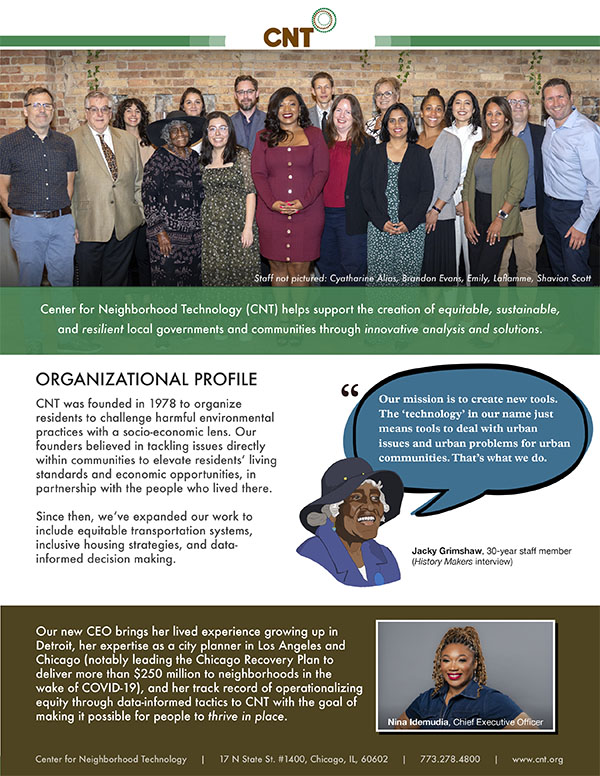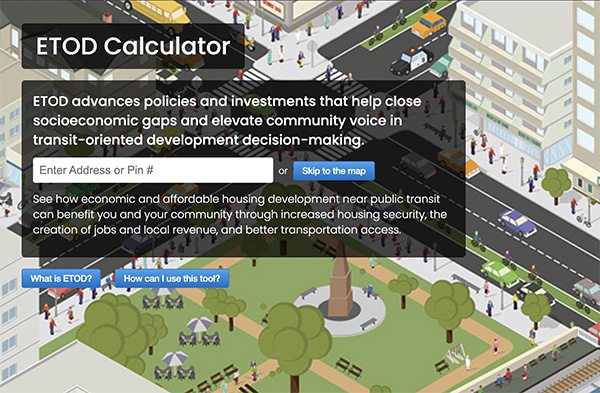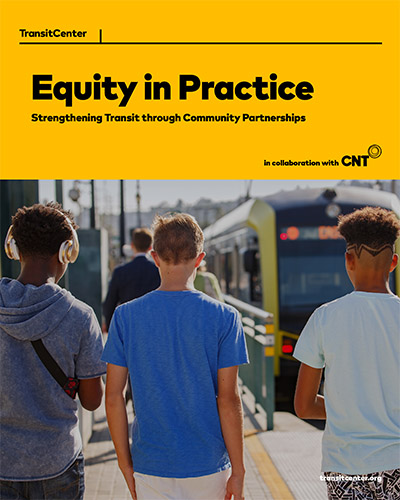
Do New Mobility Options Mean More Affordable Cities?
New technologies are changing how people get around. In cities around the world, cars, bikes, scooters, and even pogo sticks can be only a few taps on a smartphone screen away. Of all these modes, Transportation Network Companies (TNCs) like Uber, Lyft, and Via are the most prominent. Here in Chicago, the number of active TNC drivers has grown from 15,000 in March 2015 to nearly 68,000 in 2019. In March 2019, over 10 million TNC trips took place in Chicago, with pickups and drop-offs in... Continue reading »
RainReady Robbins Resilience: Outlining a Roadmap to Community Success
CNT’s mission to make cities work for everyone is realized in small part through the buy-in and support of local communities we serve alongside. With collaboration and support from individuals in the RainReady Robbins Steering Committee, CNT recently published a report on the pricing of residential drinking water in Robbins, Illinois. The primarily African-American residents of this community pay a higher rate for water than 80% of all municipalities in the region. The Village of Robbins is... Continue reading »
What eTOD Plans Need to Consider
Since its inception, CNT has pioneered sustainable, equitable, and growth-oriented solutions that reimagine how cities think about transportation and land use. One area of work is equitable transit-oriented development (eTOD), which helps underserved communities tackle affordability, meet transportation needs, and decrease climate change impacts. In light of increased community interest in walkable, connected environments, CNT recently hosted a series of workshops addressing pertinent eTOD... Continue reading »
Scott Bernstein Stepping Down After Four Decades of Pioneering Work In Urban Sustainability at CNT
FOR IMMEDIATE RELEASE (Chicago, IL, May 21, 2019) The Center for Neighborhood Technology (CNT) announces that its founder and long-time visionary leader, Scott Bernstein, is stepping down from the organization effective September 30, 2019. “Scott has had tremendous influence in making cities more equitable and more sustainable,” said CNT Board Chair Robert Henderson. “From his innovative ideas for handling water, energy, transportation, and other critical urban systems, to his... Continue reading »
Beyond the Bill – Reflections on Achieving Community Affordability
Toward the end of March, CNT presented at Flint’s 3rd annual Environmental Justice and Resiliency summit. The summit featured four days’ worth of panels, interactive sessions, and trainings on topics ranging from trauma-informed art therapy to creating a blue-green economy in Flint. CNT was pleased to share the stage with Amy Hovey of the C.S. Mott Foundation, Leah Wiste of Michigan Interfaith Power and Light, and the City of Flint’s former CFO Hughey Newsome and Water Superintendent Rob... Continue reading »
New Mayor, New Mobility
The transportation sector is changing rapidly: growth in rideshare services (e.g. Uber, Lyft, and bikeshare), vehicle electrification, and introduction of autonomous vehicles will together lead to a complete re-imagining of our transportation system. New mobility options create new opportunities, but also the potential to widen disparities by income and race – unless we explicitly plan for equity. For that reason, the Center for Neighborhood Technology (CNT) participated on Chicago’s New... Continue reading »
Leveraging Technology to Address Urban Issues
Last week, I had a chance to introduce the Center for Neighborhood Technology to two new groups of potential friends and partners. First, we were visited by a group of Google product managers from across the nation. Many of CNT’s online interactive tools are based on Google Maps, and our conversation quickly focused on how we use these tools to identify and address urban issues. We had innumerable questions for each other: how can we partner to better calculate local transportation-related... Continue reading »
Buffalo, NY: A Rust Belt City’s new approach to tackling lead in drinking water
Buffalo’s aging infrastructure poses a lead problem. But a one-stop-shop model could unite previously siloed agencies toward a solution. Like many old industrial cities in the Great Lakes region, Buffalo, New York—located on the shores of Lake Erie—has a lead poisoning problem. Children in Erie County, many living within the City of Buffalo’s limits, test positive for lead poisoning at rates much higher than New York State average. Given Buffalo’s old housing stock—the city has... Continue reading »
Chicago’s Latest Ordinance Expands eTOD
On January 23, 2019, the Chicago City Council passed an amendment to the Municipal Code governing transit-oriented developments (TODs). This amendment modifies transit-served locations to include projects in vicinity of more than 20 CTA-designated high-ridership and high-frequency bus routes along eight1 major corridors and corridor segments. With this amendment, the City administration will also have to create and publish an Equitable TOD (eTOD) Implementation Policy Plan over the next year... Continue reading »
Welcoming Elizabeth Irvin as Transportation Director
I’m happy to welcome CNT’s newest staff person, Elizabeth Irvin, who starts work with us today as our Transportation Director. Elizabeth joins us from the Chicago Metropolitan Agency for Planning (CMAP), where she worked on evaluating the impacts of road and transit projects, identifying opportunities and risks of emerging transportation technologies, and advancing strategies to improve equity and sustainability in the region’s transportation system. She previously worked for Metro Boston’s... Continue reading »





 Strengthening Transit Through Community Partnerships
Strengthening Transit Through Community Partnerships












 RSS Feed
RSS Feed